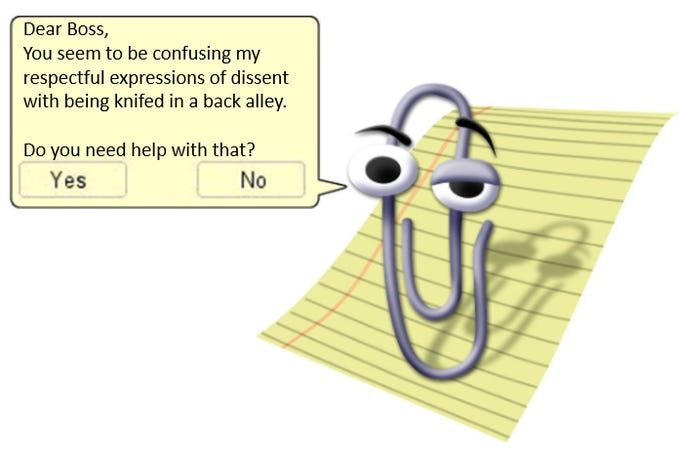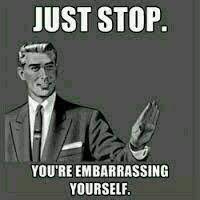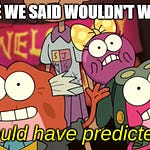So last week, we talked about Organizational Resentment, and the very next day, I see that Fortune wrote about the very same thing but called it Resenteeism. It’s basically organizational resentment packaged up to sit in contrast to presenteeism (presenteeism is the look of working and of putting in face time, problematic in part because leaders will report favorable views of those who are present, regardless of their actual productivity).
According to the article,
Resenteeism should come as no surprise. . . in a November 2022 study from software firm UKG, nearly half of American workers said they hate their job so much they wouldn’t wish it on their worst enemy.
They also state that
The aftershocks of the Great Resignation might be at least partly to blame for resenteeism catching fire. Consider a workplace that has been gutted by a string of quits and is now operating a skeleton crew. “Those who stayed in their role may have ended up feeling undervalued or unfairly treated, which can lead to a spreading sense of resentment and a lack of motivation within a workforce…”
Indeed, Fortune. Shortly after I saw that article, a reader directed my attention to this article in the NYT from Dr. Eric Reinhart, a political anthropologist and physician at Northwestern University, who situated the frustration and burnout in healthcare right where it belongs, at the nexus of formative contexts:
…doctors learned to rationalize a deeply unequal health care system that emphasizes personal, rather than public, moral responsibility for protecting health. We sit at our patients’ bed sides and counsel them on their duty to counteract the risks of obesity, heart disease and diabetes, for example, while largely ignoring how those diseases are tied to poor access to quality food because of economic inequities. Or, more recently, we find ourselves advising patients on how to modulate their personal choices to reduce their Covid risk while working in jobs with dismal safety practices and labor protections.
And I’m happy to include his article as a lead-in for this piece because Reinhart lays it down right here when he says
Neither major political party is making universal health care a priority right now, but doctors nonetheless hold considerable power to initiate reforms in health policy. We can begin to exercise it by following the example of colleagues at Montefiore Medical Center in the Bronx who, like thousands of doctors before them, recently took steps to unionize. If we can build an organizing network through doctors’ unions, then proposals to demand universal health care through use of collective civil disobedience via physicians’ control over health care documentation and billing, for example, could move from visions to genuinely actionable plans.
Also this past week, the president of the United States in the SOTU issued a call to pass the PRO Act to protect employees’ right to organize.
AND THEN LITERALLY THE VERY NEXT DAY:
AND THEN ALSO apparently they stripped grad students of their health insurance. The article linked here says that the university said that strikers aren’t entitled to benefits under PA state law, but the article doesn’t indicate whether it’s true that Temple can’t offer them anyway.
Temple, my friends! Read the room.
The formative context for organizing, clearly, is ripe and fertile: I expect we’ll see more and more organizing in the churning wake of our current economic arrangements, and leaders, I’m gonna give it to ya straight in this post in a way your union-busting lawyers will not:
Businesses and organizations will want to stop relying on the same tired playbook when confronted with labor organizing in their environments.
We’re gonna draw on some advice here from a venture capitalist who is also teaching about this subject at UC Berkeley, Roy Bahat, and Thomas Kochan, professor emeritus at MIT Sloan.
They shared some advice in the HBR, and maybe we’ll find ourselves in a new era of understanding some crucial organizational and economic dynamics if people start following their advice, especially since the advice is rooted in good leadership principles (I’ll unpack it in a moment).
But first, here are selections from the tired playbook:
Anti-union propaganda that situates org leaders as voices of paternalism who purport to know what’s best for organizational members; communication that includes half-truths, mistruths, and threats; and punitive action that walks the fine line between legal and not
It’s exhausting to watch, embarrassing to witness, and hideous to live through.
Maybe it’s because those tactics don’t even work and are especially outdated for our newest crop of org members.
I need to share this information as a leadership scholar because if leaders don’t already realize it, let me break it to ya:
GenZ is built different. IYKYK, but if you don’t, believe me when I tell you.
Built. Different. And they’re not gonna tolerate any BS in the org because they see right through it.
We can thank, in part, a series of “once-in-a-lifetime” events that dot the landscapes of their lives. They’ve watched their hard-working, rule-following parents and grandparents lose pensions, retirement savings, health, lives, homes, careers, jobs, and public goods while rich people keep getting richer, decimating the climate, political landscape, and the economy in the process.
The game is rigged, and they know it. They have little tolerance for the typical organizational nonsense.
As a result, I expect to see increased organizing in the years ahead or at the very least, lots of job-hopping. GenZ knows there’s no reward in loyalty to organizations that have no regard for them.
I was delighted, then, to see the article in HBR about how businesses should and shouldn’t react when labor organizes, though I am far less delighted to see the very opposite of the advice I’m about to share unfold for Temple grad students. I’ll share with you the main thrust of that HBR piece along with my qualitative and theoretical flavor, and I will do my best to keep a lid on my feelings.
I don’t come to this conversation as a labor expert (just a casual observer, daughter of a unionized welder, and a decade-long reader of In these Times), but I have done my research. I had some very specific questions as I watched organizing unfold specifically in higher education and specifically after George Floyd’s murder.
Mostly, I wanted to know how orgs that call themselves anti-racist could also be anti-labor in light of my own philosophies around the relationship between material conditions and racial justice. I’ll spare us the details of that investigation, but I did find my answer. It’s not flattering for those orgs.
Really, I came to this conversation initially just as a writer. I’m looking at anti-union propaganda specifically at higher education orgs across the country and thinking, “Really? You think that is an effective means of delivering your message to your educated audience? You are literally making the pro-union case with those rhetorical choices!”
(And whoever taught you rhetoric or persuasion in college is not angry, just disappointed.)
On a secondary level, I came to this as a leadership expert who focuses on power because that’s what this conversation is about: Power. It’s one reason I expect to see more organizing: As individuals continue to lose power to surveillance capitalism and creeping authoritarianism, we’ll work to find power where we can; one place is in the organization, especially if employers continue to stomp on the necks of employees for the sake of shareholder profits.
Or, as in healthcare and higher ed, continuing to squeeze the labor force, piling up the tasks of eliminated positions on the people who remain and requiring more and more stretch as we work to cover ever-growing gaps created by the upward flow of our collective resources.
And in a related strand of conversation, it’s no surprise to me to see states like Florida stomping down on discussions around race, gender, and class because those discussions are about power. Those dynamics have direct bearing on this conversation: If people don’t have a vocabulary around things like institutional racism, they might not conceptualize how power manifests itself in the worker/owner relationship, either.
These things are all connected, of course1.
One reason I’m sharing this information is that the advice from the HBR writers is firmly rooted in good leadership principles. Despite that, though, leaders should take time to plan because not everyone’s leadership rests on good principles, does it? Without a plan, we might fall back onto our biases and proclivities and leadership tactics that aren’t exactly supported by evidence without thinking about it.
Largely, the new playbook focuses on offense instead of defense.
Here’s the first thing: Drop the Ego.
It ain’t about you, brah.
Leaders often have ego problems, and while that discussion is beyond the scope of this piece, it’s a Known Issue.
Bahat and Kochan say it directly:
So set your pride aside, try not to take organizing personally, and definitely don’t tell workers what’s in their interest. They’re experts at their own lives and interests, and they’re unlikely to accept that you — a powerful leader whose reality may be removed from theirs — know what’s best for them. Avoid condescension.
And I’ll make a special plea to anyone who uses social justice language in their org:
The one sure-fire way to demonstrate that your org is Not Serious on matters of social justice is to play defense against your own team, to attempt to demonize organizers and organizing, to fail to acknowledge how labor organizing operationalizes DEI commitments.
Labor organizing is literally a manifestation of the change we say we want to see.
That’s JV stuff, really. If org leaders are smart and truly committed to that which they say they are, they’ll see labor organizing as the opportunity it really is, especially on matters of justice.
If they’re not — if they’re just performative about their commitments — they’ll play defense and inflict punishment. How colonial of them2.
Here’s the second thing: Know the law. You can’t fire people for organizing. If you do — and if you demonize organizers as “the enemy” — you are again making the case for why your org needs a union.
What I’ve learned about union organizing is that organizing is the last stop on a long train ride of Trying to Make it Work. It’s the final destination after Multiple Conversations about Making things Right. It’s the breaking point.
It never happens overnight. Bahat and Kochan seem to suggest that it CAN happen overnight when they say this:
If your workforce catches you by surprise, the best thing you can do is get informed and build a healthy relationship with your workforce. Before you act, take a breath and think about whether, in fact, a union would be harmful for your company — or whether you might actually be able work with the union to create a better company. The effectiveness of the company-union relationship stems in large part from how you act. There is evidence that unions can actually help a company’s performance — by boosting retention, transparency, morale, and even productivity.
If organizing catches leaders by surprise, it means they weren’t listening, and again, that’s a great indication of why organizing happened to begin with: Poor leadership, specifically Poor Listening3.
The rest of their point in that quoted passage leads us to the third important piece of leadership advice: Think critically about how the situation will actually benefit your enterprise.
An organization rife with unfairness (real or perceived . . . and remember, perceived is still real), poor treatment by leaders (real or perceived), safety standards that put people's health and lives in jeopardy, and arbitrary and capricious decision making cannot retain quality employees and cannot meet its mission. That’s a level-one benefit a unionized environment brings.
But here’s a more substantive consideration about benefits as we grapple with some serious dark forces in the United States, and it relates to what I said earlier about Florida:
Unions can help protect democracy. Imagine, for a moment, that you’re a school or college administrator staring down these rabid book banners and anti-historians that are showing up at school boards and college campuses.
As a leader, you’ll sit at the nexus of forces, with accountability to the public, lawmakers, your own school community, and the largest and loudest anti-democratic voices in the conversation may also be the ones with the most political and financial sway.
When they want you to fire faculty who stand up to their nonsense, do you know who you can blame when that doesn’t happen? Do you know who will also ultimately prevent you from getting run out of town? Who will preserve your organization?
The Union. When I moderated a panel of high school faculty members and students who stood up to these bullies here in my home community, they said specifically that it was their union that protected them.
Not their administrators, even those who wanted to. Those leaders were in an untenable spot. It’s the union that stepped in.
So, where does that leave us?
Leaders in orgs like education and healthcare will want to think long and hard about their personal values before they take adverse action against their own workforce.
If you’re a leader who agrees that striking grad students should lose access to their healthcare knowing that many of them are relying on that healthcare for life-sustaining medications and care, guess what? You. Are. The. Problem.
And thus it’s obvious to me why they’re on strike. That’s a longer and deeper discussion about philosophy and morality that we’ll just leave open for now, but I do hope that people reflect on it.
Superficially, leaders, ask yourself if you really want to damage your brand that way. Behaving defensively against your own team is evidence that their decisions are justified. These choices aren’t a good look for leaders or for orgs as a whole.
Further, ask yourself how you think DEI initiatives are operationalized, specifically in the context of the relationship between material conditions and equity. What is your philosophical position here? What is your actual commitment to inclusion or to justice or to equity? If it’s just words, well…. it’ll be very easy for you to make the wrong decisions.
And finally, ask yourself about the role you want to play in protecting US democracy. If you are an ed leader and you aren’t aware of what’s happening across the country — specifically in educational organizations — I need you to turn in your keys and badge. If you can’t see the relationship between organizing and the protection of democracy, please do your work to educate yourself or get out of the way so someone who has done that work can lead.
If orgs are worried about labor organizing, the best defense is a good offense. Engaging good leadership skills like listening, empathy, empowerment, and collaboration go a long way. An ounce of prevention, as the saying goes.
There are ten million stops on the route to organizing, and leaders can change the trajectory at any time if they’re willing and if they’re adept.
But if things reach that point and labor organizes, our current landscape requires a new playbook. It’s in organizations’ best long-term interest to use it.
Next week, I have a piece for you about professional development in light of ATD’s recent release about faculty professional development. I have some addenda and contextual considerations to share, as you might imagine.
It strikes me — as a divorced person — that the process is much like a failing marriage: It’s not the first disagreement that leads to a divorce decision. It’s not the second, or the tenth, or even the hundredth. And divorce is often not for lack of trying to reach resolution. Generally, it’s only after all of the attempts at resolving the issue have failed that we find ourselves facing irreconcilable differences.
Again, GenZ ain’t having it. They just aren’t. I’ve seen those TikToks about Gramsci out there, y’all, and if I am seeing them as someone who isn’t even on TikTok, the youths . . . they are a-learnin’. So in the interest of org sustainability, I think leaders will want to seriously plan and think through their strategies should labor organize in their enterprise.
And it’s such a huge tell when orgs rail against unions: Oh no! We won’t be able to treat our employees unfairly! How will we ever manage to turn massive profits? Y’ALL. See? This is why I’m embarrassed. If your response is punishing, man….. That is such a tell. I do not understand how org leaders cannot see that.
Extending the marriage metaphor a bit, let me assert that you really don’t know someone until you divorce them. Similarly, you really don’t know an org until you organize. The true colors really do come out in those situations. Some of us walk the high road in divorce. Some do not.

















FREE ADVICE: The New Playbook on Labor Organizing